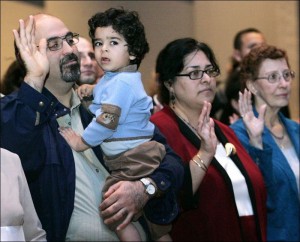Naturalization
Carl Rothrock is an immigration attorney in Fort Myers, Cape Coral, and Naples. He files N-400 and 600 applications for naturalization and eventual citizenship.
The pathway to United States citizenship starts with a visa. A person might come to this country as a family member or as an employee. The person then adjusts their temporary status to permanent status through a green card. After obtaining a green card, the person then files a petition for naturalization so that he or she can become a United States citizen.
Requirements for Naturalization
- Lawful admission to the U.S. as a permanent resident;
- At least age 18 (if applying alone. Child under 18 may be naturalized if applying with a parent).
- Continuous presence in the U.S. for a specified period depending on the type of applicant. (If you are married to a U.S. citizen, you must physically reside in the U.S. at least eighteen accumulative months prior to applying for naturalization. If you are not married to a U.S. citizen, then you must physically reside in the U.S. at least thirty accumulative months prior to applying for naturalization).
- Physical presence in the U.S. for a specified period depending on the type of applicant;
- Knowledge of U.S. history and government;
- Proficiency in English;
- Good moral character.
Benefits of Naturalization
- A permanent resident is not required to become a citizen and may reside in the United States indefinitely as a permanent resident.
- A citizen can vote in national and local elections, but a permanent resident cannot vote in U.S. elections.
- A citizen can exit and enter the U.S. without any regard to time spent outside of the U.S. Permanent residents could risk losing their status if they leave the U.S. for extended periods of time.
- A U.S. citizen can petition for the admission of alien relatives to the U.S. Permanent residents cannot file all the same petitions the U.S. citizen can.

